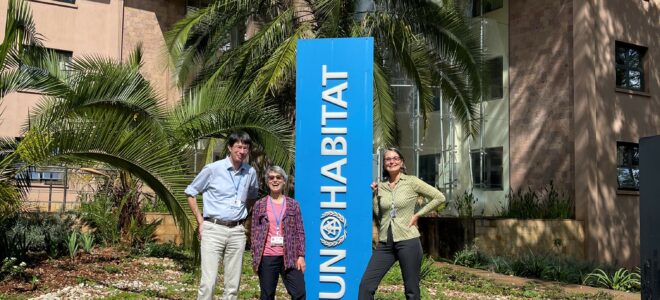The second session of the ad hoc Open-Ended Working Group (OEWG-2) on the Science-Policy Panel on Chemicals, Waste and Pollution Prevention is taking place in Nairobi, Kenya, from December 11 to December 15, 2023. Three IPCP Board Members are in attendance and are providing their daily summaries.
Today was the first day of the official OEWG-2 session. The day began with the Major Groups coordination meeting from 8:30 to 9:30 and the UN regional meetings from 9 to 10. The intention of this meeting was to give the opportunity to reach consensus on issues, which would give the Major Groups more influence during the decision-making plenary.
At 10, the OEWG-2 session was formally opened by Gudi Alkemade, the OEWG chair, and Mohammed Khashashneh, Secretary General, Ministry of Environment, Jordan. 114 states and 59 observer organizations had come to Nairobi to attend the OEWG-2 session. Chair Alkemade emphasized that all delegations should do their best to work efficiently and avoid general and repetitive statements because the amount of work for the week is extraordinary.
In the first plenary session, formal agenda items such as the adoption of the agenda and the election of officers were covered before the documents outlining the set-up of new SPP were discussed. Country delegates and observers expressed their views of the rich material presented by the OEWG Secretariat in a range of Working Documents and additional Information Documents. The Principal Officer of the OEWG Secretariat, Tessa Goverse, introduced and explained the various documents. It was generally expressed that a very good basis for the OEWG-2 session had been prepared by the Secretariat. Countries and observers highlighted different aspects of the panel – such as scientific credibility, strong Conflict-of-Interest policy, broad participation of all stakeholders, capacity building – but generally there was a consensus that the panel has the potential to contribute substantially to a better management of chemicals and waste internationally, but also in the different regions and in individual countries.
The plenary decided that four contact groups should be established for the concrete work on specific aspects throughout the week. These contact groups are more informal than the plenary, work without translation in all six UN languages, and offer more flexibility for contributions by observers. The four contact groups include: (i) scope and functions, operating principles, and conflict of interest; (ii) institutional arrangements arrangements (i.e., the bodies that would constitute the panel); (iii) work-related processes and procedures such as priority-setting procedures for the issues to be addressed by the panel; and (iv) intersessional work (i.e. between OEWG-2 and OEWG-3) and budget. Contact groups (i) and (ii) commenced their work in two parallel sessions from 6 to 9 in the evening.
Contact group (i) is chaired by Itsuki Kuroda (Japan) and Sam Adu-Kumi (Ghana). In the first part of the evening session, mostly the panel’s operating principles were discussed. Two countries suggested that the precautionary approach should be removed from the panel’s operating principles. Martin Scheringer, Chair of the IPCP, made and intervention objecting to this view by saying that the science is always incomplete and there are areas of uncertainty and lack of knowledge, but that it is nevertheless possible to anticipate in a rational way what kind of harm or impacts will be possible, and that the precautionary approach is exactly the right concept to express this possibility. A next discussion point was that an ever longer list of additional operating principles were suggested by countries and observers. In response to this, Miriam Diamond, Vice-Chair of the IPCP, made an intervention and pointed out that a comprehensive, system-wide approach is needed as an operating principle of the panel because only such an approach will make it possible to avoid a burden-shifting from chemical to chemical, region to region, vulnerable group to vulnerable group, etc.
In the second half of the evening session of this contact group, the topic of conflict of interest was discussed. CoI provisions in the Intergovernmental Panel on Climate Change, IPCC, and the Intergovernmental Science-Policy Platform on Biodiversity and Ecosystem Services, IPBES, were presented. It was generally agreed that strong CoI provisions will be necessary for the new panel. Miriam Diamond, Vice-Chair of the IPCP, made an intervention and pointed out that it is well documented in the scientific literature that CoI-driven tactics in chemicals management have delayed solutions or improvements by years and that this shows how important it is that the new panel will have strong CoI provisions, but also an effective implementation of these provisions.
Penny Vlahos, IPCP board member, attended the evening session of the second contact group, which is chaired by Sofia Tingstorp (Sweden) and Judith Torres (Uruguay). This contact group focused on the set-up and way of operation of the panel’s plenary, bureau, and expert committee. There was general consensus on the plenary and bureau structures as outlined in the document with minor revisions. There was a suggestion to add a policy committee at the bureau level, but this generated concern that the panel would be spread thin by adding too complex a structure. The secretariat was tasked with developing a schematic of the overall evolving structure for follow-up discussions.
Both contact groups will continue their work in the evening of the next day. This first day can be characterized as a good start into the OEWG-2 session, but soon also presented many open questions where it is not yet clear how they will be resolved.
—
Longer daily reports prepared by the International Institute for Sustainable Development, Earth Negotiations Bulletin are available at: https://enb.iisd.org/oewg2-science-policy-panel-contribute-sound-management-chemicals-waste-prevent-pollution
